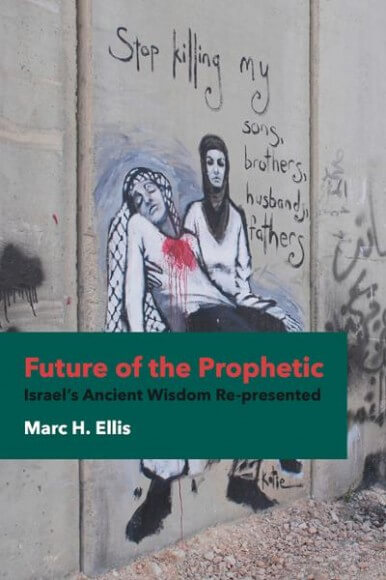This is part of Marc H. Ellis’s “Exile and the Prophetic” feature for Mondoweiss. To read the entire series visit the archive page.
Yesterday the Guardian reported that Prime Minister Netanyahu was proposing new legislation enshrining Israel as a Jewish state. Of course, he guaranteed everyone else equal rights – whatever that could mean in real life. The Jewish state is being assaulted claims Netanyahu. Is it Israel’s critics or Israel’s policies of occupation and ghettoization?
Netanyahu’s language is interesting in this regard:
The state of Israel provides full equal rights, individual rights, to all its citizens, but it is the nation state of one people only – the Jewish people – and of no other people. And therefore, in order to bolster the status of the state of Israel as the nation state of the Jewish people, I intend to submit a basic law that will anchor this status.
Of course, there are those who do not want the state of Israel to be defined as the nation state of the Jewish people. They want a Palestinian nation state to be established alongside us and that Israel should gradually become a binational, Arab-Jewish state inside shrunken borders. But I simply say that one cannot hold the national stick at both of its national ends.
They cannot say that they want to separate from the Palestinians in order to prevent a binational state, which has a certain logic, and also sanctify a binational, Jewish-Arab state within the permanent borders of the state of Israel.
Did I miss something in translation or is Netanyahu asserting that those who still want two states, not the one state, are also calling for the destruction of the Jewish state because Palestinian citizens of Israel – exist?

Last night my dreams were haunted and this morning I cut my usual sunrise walk short. I am experiencing my book’s arrival like a summons. Perhaps I’m afraid to face the words I’ve written.
Am I afraid because my words remind me of my own commitments and their cost? Because I have failed in my commitments and still paid the price? Because I know that what I and many others want is, at least for now, stillborn?
Is it because Netanyahu’s reign has no end in sight?
Trauma comes in many forms. Writing is one of them. Reading your own words is another.
It was Franz Kafka who explored the trauma of the written word:
I think we ought to read only the kind of books that wound and stab us. If the book we’re reading doesn’t wake us up with a blow on the head, what are we reading it for? So that it will make us happy, as you write? Good Lord, we would be happy precisely if we had no books, and the kind of books that make us happy are the kind we could write ourselves if we had to. But we need the books that affect us like a disaster, that grieve us deeply, like the death of someone we loved more than ourselves, like being banished into forests far from everyone, like a suicide. A book must be the axe for the frozen sea inside us.
So my books will remain unpacked for days and even weeks. But they won’t be out of sight. The books will remain in the middle of my living room, conspicuous, and in the way. Each time I cross the living room, I’ll make my way around them. My unopened books will not be forgotten.

The delay in unpacking books I’ve written has become a ritual of late. It started years ago with another traumatic book, the Bible. Some pages into the prophet Jeremiah, I began to experience his journey as a wound that might never heal. I stopped reading Jeremiah and left the Bible on the table where I sit in the early evening. Months later, no matter the book I was reading, I remembered Jeremiah.
You can’t close the book on trauma, Biblical, Netanyahu or otherwise. Once incurred, trauma shadows us. When you think you’ve packed it away, it reappears.
Even unopened and unread, an author is reminded that what he has created, once public, is no longer his. Perhaps the author is afraid that her words are already passé. That the world has moved on. That the sentences the author sweated over are irrelevant. Or, in the age of Netanyahu, too relevant.
My book won’t change Netanyahu or the direction of Jewish life. Besides, my book is flawed. It covers too many angles of Jewish life to be concise. It makes outrageous claims as if they are self-evident. My writing style is inconsistent. At times, my words are searching and poetic, at other times harsh and analytical. Every paragraph is open to argument.
I doubt many will listen anyway. The task before us is too immediate. My emphasis on the Biblical Jewish prophetic as it resounds in today’s world is too internal, too narrow and, let’s be honest, too Jewish.
Nowadays most Jewish thinking is associated with Netanyahu’s injustice or some progressive interpretation of Jewish life that surrounds Palestinians with a verbal Wall much like the concrete Wall they experience daily. Who wants to hear from Jews about Jewish history and theology, the Holocaust and the prophetic?
Perhaps books written by Jews of Conscience should remain for decades in the boxes in which they arrive. They could resurface in another era and be accorded the status of relics. Curious collectors could carefully unpack and expose them to the ethical light of day.
Would these books then function as an “axe for the frozen sea inside us?”
My book is a wake-up call. It is also a work of mourning.
In the age of Netanyahu, I experience Jewish life as a disaster. Is there any other word for it?
These words grieve me deeply.
Like the death of someone I love more than myself.


this is a very endearing post of yours marc. and i love that photo of you looking down at the unopened box containing your new book.
http://store.fortresspress.com/store/product/19293/Future-of-the-Prophetic-Israel-Ancient-Wisdom-Re-presented
Very poignant words indeed…
Netanyahu: “and that Israel should gradually become a binational, Arab-Jewish state inside shrunken borders”.
OK, I understand that PRoR means, to him, binational. Maybe Palestinian human rights and civil rights as citizens (not nationals) of Israel also seems to him “binational”.
But “Inside shrunken borders” ! How ghastly to have to rub shoulders with people of another nation inside a SHRUNKEN state! Ouch! (Of course, we New York city folks, perhaps most Americans rub shoulders with all kinds of people every day without trouble, even through we don’t honor those differences with the name: nationalities.
But back to “shrunken Borders.”
Does N’yahu claim, then, that Israel has bigger borders now, today? Bigger than what? does he claim Greater Israel out to the wall, including the Jordan valley? Is that what he fears will shrink?
Or does he fear that a peace treaty with the Palestinians could reduce Israel’s size from its internationally recognized (provisional) borders, that is, those agreed to in treaties with Egypt and Jordan and the rest the provisional, armistice, lines of 1948?
Or does he see international action coming soon as a result of the Kerry abandonment, and fear the unspeakable but doubtless heavy hand of the international community — let by nasty BDS-made ideas — falling on Israel and compressing it, shrinking it?
Delicious, is it not? And will a further anti-democratic law in Israel make all this more likely or less likely?
Congratulation, Marc Ellis, on receiving your author’s copies. I hope you allow yourself to enjoy the sweetness of that always-special occasion. I can’t think of a more important message from the Tanakh to teach than the place and importance of the Hebrew prophets. During my inadequate attempts to teach freshman students some little about this, I was sure about very little except for the fact that this tradition of courageous critique was a cornerstone of the later ideas of freedom of speech.
>> But I simply say that one cannot hold the national stick at both of its national ends.
Right – you can’t have Israeli state and “Jewish State”, so which one will it be?
>> They cannot say that they want to separate from the Palestinians in order to prevent a binational state, which has a certain logic, and also sanctify a binational, Jewish-Arab state within the permanent borders of the state of Israel.
Why not? One Palestinian state with Palestinian citizenship, and one Israeli state with Israeli citizenship. Works just fine.
King Bibi, though, wants “Jewish State”…but there’s no such thing as Jewish citizenship and he’s not prepared to proclaim any such thing for fear of watering down the Jewish brand.
Jewish supremacism’s no fun if you don’t get to exclude non-Jewish people… :-(